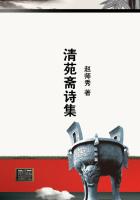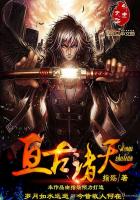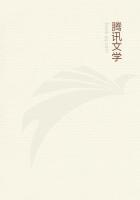As Barth observes, the very ideas which permeate the Veda, the idea of the mystic efficacy of sacrifice, of brahma, prove that the poems are profoundly sacerdotal; and this should have given pause to the writers who have persisted in representing the hymns as the work of primitive shepherds praising their gods as they feed their flocks. In the Vedic age the ranks of society are already at least as clearly defined as in Homeric Greece. "We men," says a poet of the Rig-Veda, "have all our different imaginations and designs. The carpenter seeks something that is broken, the doctor a patient, the priest some one who will offer libations. . . . The artisan continually seeks after a man with plenty of gold. . . . Iam a poet, my father is a doctor, and my mother is a grinder of corn." Chariots and the art of the chariot-builder are as frequently spoken of as in the Iliad. Spears, swords, axes and coats of mail were in common use. The art of boat-building or of ship-building was well known. Kine and horses, sheep and dogs, had long been domesticated. The bow was a favourite weapon, and warriors fought in chariots, like the Homeric Greeks and the Egyptians. Weaving was commonly practised. The people probably lived, as a rule, in village settlements, but cities or fortified places were by no means unknown. As for political society, "kings are frequently mentioned in the hymns," and "it was regarded as eminently beneficial for a king to entertain a family priest,"on whom he was expected to confer thousands of kine, lovely slaves and lumps of gold. In the family polygamy existed, probably as the exception. There is reason to suppose that the brother-in-law was permitted, if not expected, to "raise up seed" to his dead brother, as among the Hebrews. As to literature, the very structure of the hymns proves that it was elaborate and consciously artistic.
M. Barth writes: "It would be a great mistake to speak of the primitive naivete of the Vedic poetry and religion". Both the poetry and the religion, on the other hand, display in the highest degree the mark of the sacerdotal spirit. The myths, though originally derived from nature-worship, in an infinite majority of cases only reflect natural phenomena through a veil of ritualistic corruptions. The rigid division of castes is seldom recognised in the Rig-Veda. We seem to see caste in the making. The Rishis and priests of the princely families were on their way to becoming the all-powerful Brahmans. The kings and princes were on their way to becoming the caste of Kshatriyas or warriors. The mass of the people was soon to sink into the caste of Vaisyas and broken men. Non-Aryan aborigines and others were possibly developing into the caste of Sudras. Thus the spirit of division and of ceremonialism had still some of its conquests to achieve.
But the extraordinary attention given and the immense importance assigned to the details of sacrifice, and the supernatural efficacy constantly attributed to a sort of magical asceticism (tapas, austere fervour), prove that the worst and most foolish elements of later Indian society and thought were in the Vedic age already in powerful existence.
Les Religions de l'Inde, p. 27.
ix. 112.
Ludwig, Rig-Veda, iii. 203. The burgs were fortified with wooden palisades, capable of being destroyed by fire. "Cities" may be too magnificent a word for what perhaps were more like pahs.
But compare Kaegi, The Rig-Veda, note 42, Engl. transl. Kaegi's book (translated by Dr. Arrowsmith, Boston, U.S., 1886) is probably the best short manual of the subject.
Deut. xxv. 5; Matt. xxii. 24.
Revue de l'Histoire des Religions, i. 245.
Ludwig, iii. 262.
On this subject see Muir, i. 192, with the remarks of Haug.
"From all we know, the real origin of caste seems to go back to a time anterior to the composition of the Vedic hymns, though its development into a regular system with insurmountable barriers can be referred only to the later period of the Vedic times." Roth approaches the subject from the word brahm, that is, prayer with a mystical efficacy, as his starting-point. From brahm, prayer, came brahma, he who pronounces the prayers and performs the rite. This celebrant developed into a priest, whom to entertain brought blessings on kings. This domestic chaplaincy (conferring peculiar and even supernatural benefits) became hereditary in families, and these, united by common interests, exalted themselves into the Brahman caste. But in the Vedic age gifts of prayer and poetry alone marked out the purohitas, or men put forward to mediate between gods and mortals. Compare Ludwig, iii. 221.
Thus it is self-evident that the society in which the Vedic poets lived was so far from being PRIMITIVE that it was even superior to the higher barbarisms (such as that of the Scythians of Herodotus and Germans of Tacitus), and might be regarded as safely arrived at the threshold of civilisation. Society possessed kings, though they may have been kings of small communities, like those who warred with Joshua or fought under the walls of Thebes or Troy.
Poets were better paid than they seem to have been at the courts of Homer or are at the present time. For the tribal festivals special priests were appointed, "who distinguished themselves by their comprehensive knowledge of the requisite rites and by their learning, and amongst whom a sort of rivalry is gradually developed, according as one tribe or another is supposed to have more or less prospered by its sacrifices". In the family marriage is sacred, and traces of polyandry and of the levirate, surviving as late as the epic poems, were regarded as things that need to be explained away. Perhaps the most barbaric feature in Vedic society, the most singular relic of a distant past, is the survival, even in a modified and symbolic form, of human sacrifice.
Weber, p. 37.
Wilson, Rig-Veda, i. p. 59-63; Muir, i. ii.; Wilson, Rig-Veda i. p. xxiv., ii. 8 (ii. 90); Aitareya Brahmana, Haug's version, vol. ii. pp. 462, 469.

